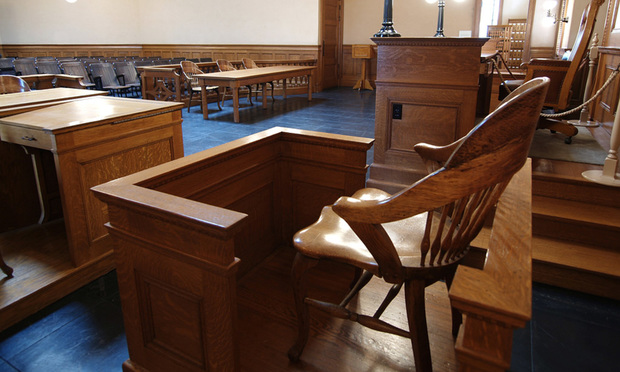
October 30, 2020 | New York Law Journal
Rush To Rule: More Trump-Era Agency Actions Destined for a Loss in CourtAs of Oct. 7, 2020, the Trump administration has lost a staggering 119 times in federal court over its use of agency action. It has been successful 22 times. With that in mind, this article summarizes some of the most impactful changes.
By Amy Haberman and Zlatko Hadzismajlovic
13 minute read

October 29, 2020 | New York Law Journal
When Settlements "Hit The Wall"A discussion of techniques that might be used by lawyers to convince or persuade the client or the other side to settle.
By Thomas F. Liotti and Lucia Maria Ciaravino
5 minute read

October 28, 2020 | New York Law Journal
Fourth Department, Preserving Weight of Evidence Contentions; Judicial NoticeOn, Aug. 20, 2020, the Fourth Department issued two decisions, 'Defisher v. PPZ Supermarkets,' and 'Alexandra R. v. Krone,' which the author describes as "momentous strides in the seeming evolution toward the death knell of CPLR 4404 as applied to the method of preservation of the contention that a verdict was against the weight of the evidence."
By Elliott Scheinberg
13 minute read

October 28, 2020 | New York Law Journal
Can You See Me Now? Lessons Learned From Virtual ProceedingsA focus on the authors' experiences in virtual depositions, arguments, and trials, outlining the challenges they see and offering solutions they've found that others can apply to their practice.
By Mike Bowe and Lauren Tabaksblat
8 minute read

October 27, 2020 | New York Law Journal
The Pandemic's Impact on Eviction ProceedingsTodd Soloway and Rachel Shaw discuss the most recent pandemic-related governmental and administrative orders issued limiting eviction proceedings and their impact on both commercial and residential proceedings in New York City, including limitations placed on personal guarantors.
By Todd Soloway and Rachel E. Shaw
8 minute read

October 27, 2020 | New York Law Journal
Realty Law DigestScott E. Mollen, a partner at Herrick, Feinstein, discusses "Platt v. Windsor Owners Corp.," and a commercial landlord-tenant case "Westbury Flats LLC v. Backer."
By Scott E. Mollen
13 minute read

October 27, 2020 | New York Law Journal
Amended Guaranty Law Raises Questions of Statutory Interpretation and ConstitutionalityAn analysis of the conflict that exists between the Amended Guaranty Law's explicit statutory language and the City Council's newly published declaration of legislative intent and findings. The article looks at the question of statutory interpretation and examines whether the newly amended Guaranty Law passes muster under the U.S. Constitution's Contracts Clause.
By Eliad S. Shapiro
14 minute read

October 27, 2020 | New York Law Journal
NYC Human Rights Law: The 'Gold Standard' of Anti-Discrimination Laws?Exploring the history of the New York City Human Rights Law, including what differentiates it from other anti-discrimination statutes. The article also provides practical recommendations for employers grappling with the law's multifaceted requirements.
By Mark S. Goldstein and Alexandra C. Manfredi
9 minute read

October 26, 2020 | New York Law Journal
The Underutilization of "Racketeering" Claims in Restrictive Covenant CasesRecovering triple damages plus attorney fees should sound enticing to any business seeking to stop unscrupulous former employees and their new employers attempting to steal trade secrets and unfairly compete; surprisingly, few businesses bring claims under the Racketeer Influenced and Corrupt Organizations Act even though RICO, in certain cases, would allow for such relief.
By Jack Kiley, Kevin Smith and Jamie Moelis
8 minute read

October 23, 2020 | New York Law Journal
The Admissibility of Co-Conspirator Statements RevisitedThis article takes an in-depth look at one of the tools the government often uses to win their cases: the co-conspirator hearsay exemption, including the application of this evidentiary rule in the modern era of contemporaneous electronic communications. It examines the origination, evolution, and practical application of this key rule, and considers options available to defense lawyers seeking exclusion.
By Mike Miller and Morgan Lucas
9 minute read
Trending Stories
- 1Decision of the Day: Judge Sanctions Attorney for 'Frivolously' Claiming All Nine Personal Injury Categories in Motor Vehicle Case
- 2Second Judge Blocks Trump Federal Funding Freeze
- 3Crypto Hacker’s $65 Million Scam Ends in Indictment
- 4Trump's Inspectors General Purge Could Make Policy Changes Easier, Observers Say
- 5Supporting Our Supreme Court Justices in the Guardianship Part



